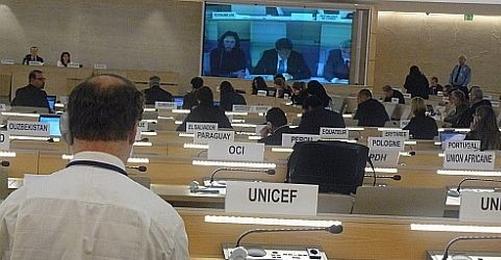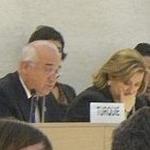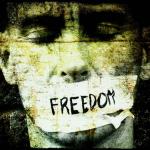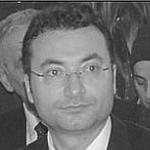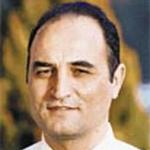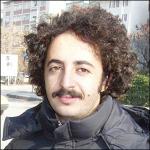On 10 May, Deputy Prime Minister Cemil Çiçek introduced a report about the situation of press freedom and freedom of expression in Turkey at the United Nations Human Rights Council (UNHRC). However, some information and evaluations put forward by Çiçek did not reflect reality.
Upon request, bianet obtained a copy of the speech Çiçek gave in Geneva.
Cases based on the Anti-Terror law did not decrease
Çiçek had said that judges and prosecutors receive exhaustive training at the Academy of Justice on the topics of press freedom and freedom of expression, both before becoming professionals and also while on duty. "Judicial decisions related to press freedom in our country are given only for the reason of propaganda for a terrorist organization. The number of this kind of trials has decreased", Çiçek stated.
It is known that the Anti-Terror Law (TMY) restricts journalism and the pronouncement of thoughts on the Kurdish question in particular to a considerable extend and moreover carries potential imprisonment of up to 7.5 years in this context.
In the Media Monitoring Report for January-February-March 2010 by the Independent Communication Network (BİA) (available in English soon) it was announced that the Kurdish Azadiya Welat newspaper received a two-month publication ban; journalists Hakan Tahmaz from Birgün newspaper, Veysi Sarısözen from Günlük newspaper, Rıfat Başaran from Radikal newspaper and Namık Durukan from Milliyet newspaper are facing prison sentences. Lately, Merve Erol and İrfan Aktan had to be added to this list as well.
The BİA report points out the opposite development, namely a significant increase of trials related to Kurdish politicians and the Kurdish environment in particular.
Ministry's permission for 301 - "two-fold assurance"?
In the text read out to the UN, Çiçek referred to article 301 of the Turkish Criminal Code (TCK) (ban of "insults" to the Turkish state). It was said that the article was amended in May 2008 and that "freedom of expression was taken under a two-fold assurance" since an investigation respectively prosecution depended on the permission of the Ministry of Justice.
Çiçek put forward that out of a total of 222 cases brought before the Ministry of Justice during the first four months of this year only four permissions were issued.
However, professional press institutions in Turkey neither think that problematic regulations stem from the TMY only, nor are they of the opinion that the problems of the TCK are limited to article 301. They furthermore do not agree with the view that the ministry's interference into article 301 creates any kind of assurance.
The press organizations advance the widespread view that there are more than 25 articles that restrict press freedom and freedom of expression.
Working group for reform of the TCK
A few articles to criticise are article 318 on "discouraging people from performing military service, article 216 on "inciting hatred and hostility", article 301 related to "insult of the Turkish nation", article 215 on "praising crime and a criminal", article 305 criminalizing "acts against the fundamental national interest", article 125 on "defamation", article 220/6 regarding "committing a crime on behalf of an illegal organization", article 288 related to "the attempt of influencing a fair trial", article 277 criminalizing "the attempt to influence those performing a judicial duty" or article 285 on "violation of secrecy". Besides, a 4.5 years' prison sentence is stipulated by the Law related to Crimes against Atatürk, founder of the Turkish Republic, which went into effect in 1951.
Çiçek declared that a working group has been established for some articles in respect to doubts about freedom of expression voiced by some international institutions and non-governmental organizations
Internet: Optimizing the "notice and take down" system
Concerning the internet, the document refers to the application of "notice and take down" principle which prevents full access bans to internet site by reason of their content, saying that "accesses was not restricted to any internet site". This system was supposed to be implemented for foreign sites as well, but due to different national legislations no significant results could be achieved. For this reason, decisions to ban access were given upon a judge's decision, Çiçek explained.
In addition, it was stated that the Telecommunication Communication Presidency applied for membership of the INHOPE (International Association of Internet Hotlines) in 2008 and that the application process is still being continued. "Wihin the framework of the INHOPE membership, Turkey aims at optimizing the "notice and take down" system for foreign internet sites", it was said. (EÖ/VK)





